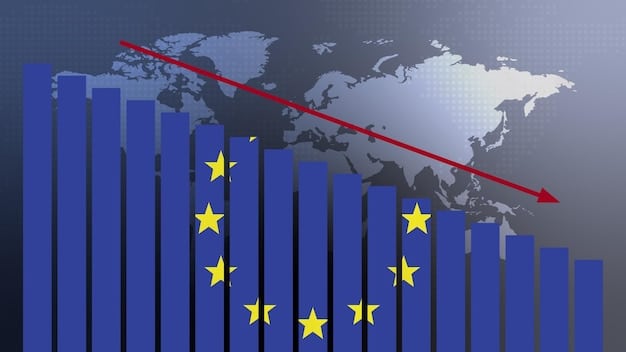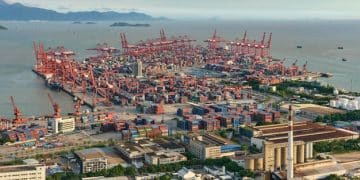Trade War 2025: US vs EU – Potential Outcomes & Impacts

In 2025, a potential US trade war with the EU could result in increased tariffs, reduced trade volumes, altered supply chains, and economic slowdowns in both regions, affecting various sectors and international relations.
The prospect of a US Trade War with the EU in 2025 looms large, raising concerns about its potential repercussions on global trade and economic stability. Understanding these potential outcomes is crucial for businesses, policymakers, and citizens alike.
Analyzing a Potential US-EU Trade War in 2025
A trade war between the United States and the European Union in 2025 could manifest in several ways, driven by various factors such as disagreements over tariffs, regulatory standards, and geopolitical tensions. Understanding these potential triggers and manifestations is key to anticipating the outcomes. This section will look at the trade dynamics and the current relationships.
Tariff Escalation and Retaliation
One of the primary manifestations of a trade war is the imposition of tariffs on goods traded between the US and the EU. This could start with one side imposing tariffs on specific products, leading to retaliatory tariffs from the other side, escalating the conflict. Consider the potential ramifications of these tariffs on goods coming to the US.
Regulatory Non-Alignment
Trade disputes can also arise from differing regulatory standards related to product safety, environmental protection, and technology. Divergences in these standards can create non-tariff barriers to trade, hindering market access and fueling trade tensions. It is important to consider how different regulations can affect trade relations.
- Impact on Consumers: Increased costs, reduced choices, and potential shortages are looming.
- Business Challenges: Companies face higher expenses, supply chain disruptions, and market uncertainty.
- Geopolitical Implications: Strained relations and shifts in global alliances are emerging concerns.
- Economic Instability: Slowed growth, inflation, and market volatility are potential outcomes.
In conclusion, a US-EU trade war in 2025 could involve tariff escalation, regulatory non-alignment, and geopolitical tensions. These manifestations can have significant repercussions for businesses, consumers, and the global economy. Understanding these possibilities is essential for effective planning and risk mitigation.
Economic Repercussions for the US Economy
The economic impact of a US-EU trade war on the US economy could be far-reaching, affecting various sectors and macroeconomic indicators. Analyzing these potential effects is crucial for policymakers and businesses to prepare for and mitigate the adverse consequences. These can be far-reaching and affect a range of macro and micro economic environments.
Decline in Exports
Higher tariffs imposed by the EU on US goods could significantly reduce US exports to the region. This would particularly affect sectors such as agriculture, automotive, and manufacturing, which rely heavily on the EU market. With that in mind, the export rate to the EU will decline.
Reduced Investment
Trade tensions and uncertainty can deter foreign direct investment (FDI) into the US, as companies may delay or cancel investment plans due to concerns about market access and trade barriers. This can have a long lasting effect on potential growth.

A US-EU trade war could have substantial economic repercussions for the US economy, including a decline in exports, reduced investment, and supply chain disruptions. These effects can lead to slower economic growth and increased uncertainty for businesses and consumers. Effective policy responses are needed to mitigate these risks.
Economic Repercussions for the EU Economy
Similar to the US, the EU economy would also face significant challenges in the event of a trade war. Reduced trade, increased costs, and economic uncertainty could negatively impact various sectors and macroeconomic indicators. Understanding the potential impacts is crucial if one is to understand trade relation impact. This section will delve into how this relationship can impact the EU.
Damage to Key Industries
Certain industries in the EU, such as automotive, aerospace, and agriculture, are heavily reliant on exports to the US market. A trade war could harm these industries, leading to job losses and reduced economic output. It is important to be aware of the potential consequences.
Supply Chain Disruptions
The EU’s intricate supply chains, which often involve inputs from the US, could face disruptions due to tariffs and trade barriers. This can raise production costs and reduce the competitiveness of European manufacturers. Supply chains are a major factor in trade deals and should be analyzed.
- Trade Diversion: EU looks to other markets, strengthening ties with Asia and South America.
- Policy Adjustments: EU implements measures to support affected industries and foster domestic demand.
- Innovation and Adaptation: EU pushes for technological advancements and diversified production.
- Geopolitical Realignment: EU seeks stronger alliances to counter trade war impacts.
In summary, a US-EU trade war could have substantial economic repercussions for the EU economy, including damage to key industries, supply chain disruptions, and reduced consumer confidence. These effects could lead to slower economic growth and increased unemployment. Proactive policy measures are needed to mitigate these risks.
Impact on Global Trade and Supply Chains
A trade war between the US and the EU would not be confined to these two regions alone; it could have significant ripple effects on the global trade landscape. The disruption of established trade patterns and supply chains could affect countries and businesses worldwide. As major players of trade, it is important to consider the impact of a disruption.
Disruptions and Realignment
The imposition of tariffs and trade barriers between the US and the EU could force companies to seek alternative sources of supply and new markets. This could lead to a reconfiguration of global value chains, with some countries benefiting from increased trade flows while others face reduced opportunities. These disruptions could be long lasting.
Emergence of New Trade Agreements
In response to trade tensions, other countries may accelerate efforts to establish new trade agreements among themselves, aiming to reduce their reliance on the US and the EU. This could lead to the formation of new trade blocs and a reshaping of global trade governance. These can provide an alternative to the power players of the US and EU.

In conclusion, the potential US-EU trade war in 2025 could significantly impact global trade and supply chains, leading to disruptions, realignments, and the emergence of new trade agreements. Businesses and policymakers need to monitor these developments closely and adapt their strategies accordingly.
Geopolitical Implications and Alliances
Beyond the economic realm, a US-EU trade war could have significant geopolitical consequences, affecting alliances, security cooperation, and global governance. Understanding these implications is crucial for assessing the broader impact of the trade conflict. The ripples of a trade war can effect other political and economic issues.
Strained Transatlantic Relations
A trade war could further strain the already complex relationship between the US and the EU. Disagreements over trade policy could spill over into other areas, such as defense, security, and diplomacy, weakening transatlantic cooperation. With the current political climate, these can have a significant impact on diplomatic relations.
Shifting Global Power Dynamics
As the US and the EU focus on their trade dispute, other countries may seek to increase their influence in global affairs. This could lead to a redistribution of power and a more multi-polar world order, with new actors playing a more prominent role. Other countries may seek to take advantage of this change in power.
Potential Resolutions and De-escalation Strategies
Despite the risks and challenges, a US-EU trade war is not inevitable. There are potential pathways for resolving trade disputes and de-escalating tensions through negotiation, dialogue, and compromise. This can lead to a resolution that is beneficial to all players. Understanding potential solutions is key to avoiding adverse effects.
Negotiation and Dialogue
Both the US and the EU could engage in constructive negotiations to address their trade concerns and seek mutually beneficial solutions. Regular dialogue between policymakers, businesses, and other stakeholders can help build trust and identify areas of compromise. Dialogue should be the first point of contact, before more dire circumstances arise.
Focus on Shared Interests
Despite their differences, the US and the EU share many common interests, such as promoting economic growth, addressing climate change, and ensuring global security. Focusing on these shared goals can help overcome trade disputes and strengthen cooperation in other areas. This can lead to greater alignment on goals.
| Key Aspect | Brief Description |
|---|---|
| 💥 Tariff Escalation | Increased tariffs lead to higher costs for consumers and businesses. |
| 📉 Economic Slowdown | Reduced trade negatively impacts economic growth for both US and EU. |
| 🌍 Supply Chain Disruption | Companies seek alternative sources, reshaping global value chains. |
| 🤝 Geopolitical Shifts | Strained relations lead to new alliances and a redistribution of power. |
FAQ
▼
Agriculture, automotive, and manufacturing sectors in both the US and EU would likely face significant challenges, due to increased tariffs and reduced export opportunities.
▼
Consumers would face higher prices and reduced product choices as import costs rise and businesses pass on tariff expenses, therefore limiting choice.
▼
Yes, new trade agreements with other countries could help diversify markets and reduce reliance on the US and EU, partially offsetting the trade war’s impact.
▼
Yes, because uncertainty over relations tends to reduce Foreign Direct Investment (FDI) as business plans are put on hold pending new trade relations.
▼
Yes, negotiation between policymakers, businesses, and stakeholders increases trust and can identify areas for compromise in the trade conflicts.
Conclusion
In conclusion, the potential US-EU trade war in 2025 presents significant risks to the global economy and geopolitical stability. However, proactive measures, such as negotiation, dialogue, and a focus on shared interests, can help mitigate these risks and pave the way for a more cooperative and prosperous future. Addressing the economic and geopolitical ramifications will be paramount.





